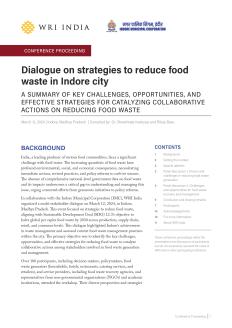Dialogue on Strategies to Reduce Food Waste in Indore City
India generates a substantial amount of food waste, posing environmental, economic, and social challenges. Addressing this issue requires targeted policies, improved management practices, and multi-stakeholder collaboration. In partnership with the Indore Municipal Corporation, WRI India convened a dialogue to explore strategies for reducing food waste, aligning with Sustainable Development Goal (SDG) 12.3. This report outlines key takeaways from the discussion, highlighting best practices, policy recommendations, and opportunities to scale effective interventions.

India, a leading producer of various food commodities, faces a significant challenge with food waste. The increasing quantities of food waste have profound environmental, social, and economic consequences, necessitating immediate actions, revised practices, and policy reforms to curb its sources. The absence of comprehensive national-level government data on food waste and its impacts underscores a critical gap in understanding and managing this issue, urging concerted efforts from grassroots initiatives to policy reforms.
WRI India organized a multi-stakeholder dialogue in collaboration with the Indore Municipal Corporation to focus on strategies that can reduce food waste, aligning with Sustainable Development Goal (SDG) 12.3’s objective to halve global per capita food waste by 2030 across production, supply chain, retail, and consumer levels. This dialogue highlighted Indore’s achievement in waste management and assessed current food waste management practices within the city along with the key challenges, opportunities, and effective strategies to catalyze collaborative actions among stakeholders involved in food waste generation and management. This conference proceedings present insights from this dialogue based on the diverse perspectives and inputs shared by over 100 participants, including decision makers, policymakers, food waste generators (households, hotels, restaurants, catering services, and retailers), and service providers, including food waste recovery agencies, and representatives from non-governmental organizations and academic institutions.

